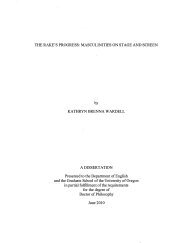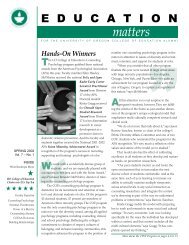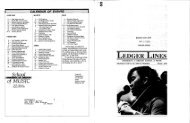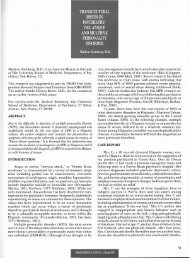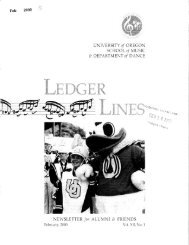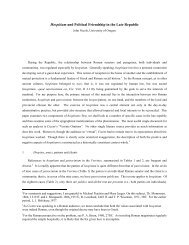~EGULAR SESSION - University of Oregon
~EGULAR SESSION - University of Oregon
~EGULAR SESSION - University of Oregon
Create successful ePaper yourself
Turn your PDF publications into a flip-book with our unique Google optimized e-Paper software.
212 COLLEGE OF LIBERAL ARTS<br />
and the College <strong>of</strong> Liberal Arts and complete the following required courses in<br />
sociology:<br />
Term Hours<br />
General Sociology (Soc 204, 205, 206) 9<br />
Social Organization (Soc 342, 343)............................................................................ 6<br />
Introduction to Social Research (Soc 311)................................................................ 3<br />
Social Psychology (Soc 334)........................................................................................ 3<br />
Development <strong>of</strong> Sociology (Soc 470) 3<br />
Majors in socioiogy are required to complete a minimum <strong>of</strong> 42 hours in<br />
sociology; not more than 54 hours in sociology may be counted toward a bachelor's<br />
degree.<br />
A grade-point average <strong>of</strong> 2.00 or higher in all sociology courses is required<br />
for graduation with a major in sociology.<br />
High-School Teaching. Students preparing for the teaching <strong>of</strong> social studies<br />
in the high schools may elect sociology as a field <strong>of</strong> concentration; such students<br />
should include, in their work in sociology, at least one course in the area <strong>of</strong> the<br />
family and in the area <strong>of</strong> deviant behavior. For the subject-preparation requirements<br />
for the teaching <strong>of</strong> social studies in <strong>Oregon</strong> high schools, see pages 128-129.<br />
Honors. See HONORS COLLEGE, pages 120-123.<br />
Undergraduate Concentration in Social Work. The department <strong>of</strong>fers two<br />
sequences <strong>of</strong> special value for undergraduate students who are interested in<br />
careers in social welfare: Sociology <strong>of</strong> Social Work (Soc 422, 423, 424) and<br />
Principles and Concepts <strong>of</strong> Social Work (Soc 425, 426). Students considering<br />
graduate study <strong>of</strong> social work or employment by a social-welfare agency should<br />
consult Mr. Herbert Bisno, associate pr<strong>of</strong>essor <strong>of</strong> sociology.<br />
A strong background in several <strong>of</strong> the social sciences is recommended for all<br />
students interested in careers in social welfare.<br />
Areas <strong>of</strong> Study. The department <strong>of</strong>fers introductory courses in General<br />
Sociology (Soc 204, 205, 206) and Principles <strong>of</strong> Sociology (Soc 300), and specialized<br />
upper-division and graduate courses in the following broad areas:<br />
Methodology. Introduction to Social Research (Soc 311) ; Sociological Research<br />
Methods (Soc 411, 412, 413) ; Theory and Methods in Population and<br />
Ecology (Soc 415) ; Experimental Sociology (Soc 518).<br />
Social Welfare and Social Work. Sociology <strong>of</strong> Social Work (Soc 422,423,<br />
424) ; Principles and Concepts <strong>of</strong> Social Work (Soc 425, 426).<br />
Social Psychology. Social Psychology (Soc 334, 335); Marriage and the<br />
Family (Soc 338) ; Theory <strong>of</strong> Small Groups (Soc 430) ; Group Dynamics (Soc<br />
431) ; Collective Behavior (Soc 436); Social Psychology <strong>of</strong> the Family (Soc<br />
438) ; Analytical Problems in Social Psychology (Soc 530); Propaganda and<br />
Social Control (Soc 532) ; Social Movements (Soc 537).<br />
Social Structttres and Processes. American Society (Soc 301) ; Social Organization<br />
(Soc 342, 343) ; World Population and Social Structure (Soc 303) ; The<br />
Community (Soc 304) ; Contemporary Social Problems (Soc 305) ; Criminology<br />
and Delinquency (Soc 440, 441) ; Urbanization and the City (Soc 442) ; Social<br />
Control (Soc 443) ; Social Stratification (Soc 444) ; Sociology <strong>of</strong> Race Relations<br />
(Soc 445) ; Sociology <strong>of</strong> Work (Soc 446); Industrial Sociology (Soc 447) ;<br />
Sociology <strong>of</strong> Occupations (Soc 448); Social Change (Soc 449); Analytical<br />
Problems in Social Structures and Processes (Soc 540) ; Theory <strong>of</strong> Organization<br />
(Soc 541) ; Power and Influence in Society and Community (Soc 542).<br />
Social Institutions. Social Institutions (Soc 460) ; Sociology <strong>of</strong> Religion (Soc<br />
461); Sociology <strong>of</strong> the Family (Soc 462); Social Psychology <strong>of</strong> the Family




